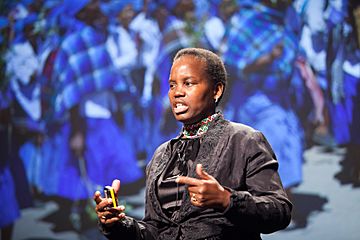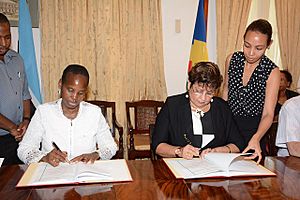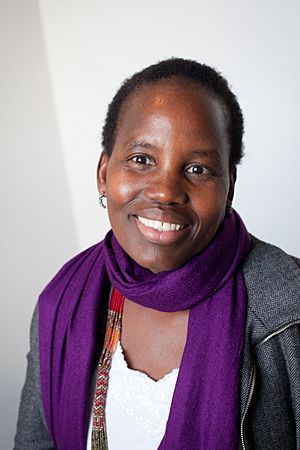Unity Dow facts for kids
Quick facts for kids
Unity Dow
|
|
|---|---|

Dow in 2011
|
|
| Minister of Foreign Affairs and International Cooperation | |
| In office 2 November 2019 – 26 August 2020 |
|
| President | Mokgweetsi Masisi |
| Preceded by | Vincent T. Seretse |
| Succeeded by | Lemogang Kwape |
| Member of Parliament for Kgatleng West | |
| Assumed office November 2024 |
|
| Preceded by | new constituency |
| Majority | 193 (1.66%) |
| Specially Elected Member of Parliament | |
| In office 2 November 2019 – 5 September 2024 |
|
| Appointed by | Mokgweetsi Masisi |
| Personal details | |
| Born |
Unity Diswai
23 April 1959 Mochudi, Bechuanaland Protectorate |
| Political party | Botswana Congress Party |
| Spouses |
Peter Nathan Dow
(m. 1984)Karl J. Stahl |
| Children | 3 |
| Alma mater | University of Botswana and Swaziland (LLB) University of Edinburgh |
| Profession | Lawyer, judge, politician, writer, and human rights activist |
Unity Dow (born Unity Diswai on 23 April 1959) is a famous Motswana lawyer, author, and human rights activist. She has also served as a Member of Parliament for Kgatleng West since November 2024. Before that, she was a judge on the High Court of Botswana and worked in different government roles.
Unity Dow grew up in a traditional village in Botswana. Her parents, a seamstress and a farmer, strongly believed in education for their children. She earned her law degree in 1983 from the University of Botswana and Swaziland. At that time, Botswana did not have its own law school, so she also studied in Swaziland and Scotland.
After finishing her studies, Unity Dow opened the first law firm in Botswana run entirely by women. In 1997, she made history by becoming the first woman to be appointed as a judge to Botswana's High Court.
During her legal career, Dow was involved in three very important cases in Botswana:
- In 1990, she was the person who brought the case Unity Dow v Attorney-General. This case changed Botswana's nationality laws, which used to be unfair to women. Before this, children could not get their nationality from their married mothers. This case brought Unity Dow international attention and inspired other countries in Africa to change their laws too.
- In 2006, as a judge, she ruled in a case involving the Basarwa indigenous people. The government had tried to stop them from living and hunting on their traditional lands. Dow ruled that the government had to let them return, provide basic services, and pay money to those who had been forced to move.
- In 2014, Dow helped LEGABIBO (Lesbians, Gays & Bisexuals of Botswana) win their case to officially register their organization. The government had refused to register them, but Dow successfully argued that this was against the right to free association.
Unity Dow was first chosen to be a Member of Parliament in 2014. She has served as a minister in different government departments, including Education, Infrastructure, and International Affairs. She has also worked on international committees, looking at how human rights laws are used in countries like Kenya, Palestine, Rwanda, and Sierra Leone. Since 2000, Unity Dow has written novels that often focus on social and legal issues, especially how they affect gender and power. She has received many awards for her work, including the Legion of Honour in 2010.
Contents
Early Life and Education
Unity Diswai was born on 23 April 1959, in Mochudi, Kgatleng District, Botswana. At that time, Botswana was known as the Bechuanaland Protectorate. Her parents, Phiri and Maefshane Diswai, were from the Mosarwa people and the BaKgatla tribe.
Unity grew up in a rural village that did not have paved roads, electricity, or running water. She did not see a refrigerator until she was a teenager or a television until she was twenty. Her mother was a seamstress who could read and write in SeTswana, but not English. Her father was a farmer who spoke and read English.
Education was very important to her parents. Her father had once won a scholarship to attend university but it was given to someone else. Because of this, six of their seven children went on to complete university studies. Unity finished her primary and secondary education in Mochudi. She then studied law at the University of Botswana and Swaziland. Since there was no law school in Botswana at the time, she studied in Swaziland and for two years in Scotland, at the University of Edinburgh. She earned her Bachelor of Laws degree in 1983.
Law and Activism
Early Career (1983–1991)
Unity Diswai became a lawyer in 1983. She started working as a prosecutor in Gaborone. On 7 March 1984, she married Peter Nathan Dow, who was from the United States. They lived in Mochudi with their three children.
In 1986, Dow started her own law firm, Dow Malakaila, which was the first law firm in Botswana run entirely by women. That same year, she helped start Emang Basadi (Stand Up for Women), the first women's group in Botswana. In 1988, her firm's name changed to Dow Lesetedi and Company. She also co-founded Women and Law in Southern Africa (WLSA) to help women and children through legal action. From 1988 to 1991, Dow researched human rights for women in six nearby countries for WLSA. In 1990, she helped create the Metlhaetsile Women's Information Centre to teach women about their legal rights.
In 1990, Dow took the government to court to challenge the Nationality law of Botswana. Under the 1984 Citizenship Act, only children born outside of marriage could get their nationality from their mother. Since two of her three children with Peter were born after they were married, they were not considered Batswana citizens. Dow was worried that if Peter's residency permit expired, her family might have to move or be separated. She argued that the law was unfair and went against her right to marry freely and live with her family. The court agreed with her.
Middle Career (1991–2009)
Unity Dow took a break from her law practice in 1991. During this time, she helped start the Baobob Primary School in Gaborone and the AIDS Action Trust. She also worked as a coordinator for WLSA from 1992 to 1994, while her court case was still being decided.
The government appealed her case, arguing that discrimination against women was allowed by the Constitution to protect traditional customs. However, the Court of Appeal decided that unfair treatment based on gender was against the Constitution. They also said that traditional customs could not go against the Constitution or Botswana's international agreements. In a close decision, the Court of Appeal upheld the High Court's ruling, stating that parts of the Citizenship Act were unconstitutional.
Because of this important ruling, the Citizenship Act was changed in 1995. This change removed the unfairness in how women could pass on nationality in Botswana. This ruling also helped women's groups across Africa push for similar changes in their own countries. By 2010, almost half of African countries had changed their nationality laws to be fairer to women.
From 1994 to 1998, Dow was the director of the Metlhaetsile Women's Information Centre. In 1995, she published The Citizenship Case, which explained the legal process of her own case. In 1996, she worked on a case about child maintenance that led to changes in the law. In 1997, she presented a case about violence against women, which she saw as very important. That same year, Dow was appointed as a judge to the High Court of Botswana, starting in January 1998. She was the first woman ever to be a judge on the High Court.
In 2004, Dow was part of a United Nations team that reviewed how international human rights laws for women were being used in Sierra Leone. She was also elected as a commissioner of the International Commission of Jurists in 2004 and again in 2009. In 2006, she was elected to the executive committee of this commission.
Dow was one of the judges for the Roy Sesana and Others v. the Government of Botswana case, which started in 2002. This case was brought by the Basarwa people (also known as Kalahari bushmen) because the government had removed them from their traditional lands in the Central Kalahari Game Reserve. The government had stopped their water supply, refused health services, and tried to force them to move.
After a four-year hearing, in 2006, Dow ruled that stopping services and forcing the Basarwa to move was against their constitutional right to life. She ordered that services be restored and that money should be paid to those who had been moved and did not want to return. She also found that hunting permits had been unfairly withheld. This case was the first time in Botswana that the rights of indigenous people to their traditional lands were recognized.
In 2007, Dow was part of a special team that looked at Rwanda's justice system. They evaluated how the country could recover from its past conflicts and ensure fair trials for those involved in the 1994 genocide. Dow retired from being a judge in April 2009. She then lectured at universities in the United States.
Later Career (2010–Present)
In February 2010, Dow started her own law firm, Dow & Associates. That same month, she was sworn in by the Kenyan President as a judge on a special court to help put Kenya's new constitution into action. In 2011, she became the chair of the Executive Committee of the International Commission of Jurists.
That year, Dow also started working with Ricki Kgositau and another transgender activist. They were having trouble getting identity cards that showed their correct gender. At the time, there was no legal way for transgender people in Botswana to change their gender on official documents. Dow helped them, and they decided to first work on a case that would set a legal example for LGBT rights.
To do this, Dow represented the human rights organization LEGABIBO (Lesbians, Gays & Bisexuals of Botswana). The government had refused to register their organization because homosexual acts were illegal in the country. Dow argued that refusing to register the group violated their right to free association. In 2014, the High Court ruled that refusing to register the group was against the Constitution, which grants freedom of expression, association, and assembly.
On 6 July 2012, the United Nations Human Rights Council appointed Dow as one of three experts to study how Israeli settlements in the West Bank affected Palestinians. That year, she decided to enter politics and joined the Botswana Democratic Party. She ran in the 2014 general election but did not win a seat in the National Assembly. However, on 28 October 2014, President Ian Khama nominated her as a special elected member of parliament. She won the vote and was appointed as the Assistant Minister of Education. In February 2015, she became the Minister of Education and Skills Development. During her time as Minister, Dow created a program to train teachers from Seychelles in Botswana and send Batswana teachers abroad to help Seychelles with their teacher shortage.
After President Khama stepped down in March 2018, Unity Dow was moved to the role of Minister of Infrastructure and Housing Development by the new President, Mokgweetsi Masisi. On 20 June 2018, she became the Minister of International Affairs and Cooperation. After Masisi won the 2019 general election, he reconfirmed Dow as Minister of International Affairs and Cooperation. In January 2020, Unity Dow, along with her daughters Cheshe and Natasha, opened the Dow Academy in Mochudi, Kgatleng District. This private school offers primary and secondary education. In August 2020, Dow left her ministry role. She said that being a regular Member of Parliament (a "backbencher") gives her more freedom to discuss many national issues.
Writing
Unity Dow started publishing fiction in 2000. At that time, not many Batswana writers were known outside Botswana. Both her non-fiction and fiction books combine social and legal issues with their effects on gender and power. Dow's books look at social practices that lead to unfair power relationships and cause violence against women, the AIDS crisis, and gender inequality. Her characters often use common sense to challenge unfair customs, but they also remind readers about the importance of traditional culture.
Her first novel, Far and Beyon′ (2000), focused on the AIDS epidemic and how violence affects families. It showed how women in a society led by men deal with families where fathers are missing because of the disease in rural Botswana. It explores the limits that cultural practices and traditions place on girls and women.
Similar ideas are found in Dow's second novel, The Screaming of the Innocent (2001). This book also looks at how women can gain power in a country with police corruption and secrets. She believes that women will be the ones to drive changes to end such problems.
Far and Beyon′ was first published in Botswana and then in Australia. The Screaming of the Innocent was first published in Australia and later in South Africa in 2003. Her third novel, Juggling Truths, was published in Australia that same year and in South Africa the next year. Dow again examined harmful cultural practices and social norms, suggesting ways to fight them. This book focuses on balancing good and bad practices within local culture. The themes in Juggling Truths connect to Dow's first two novels, suggesting that girls and women can become strong through education and independent thinking. Juggling Truths was nominated for the Percy FitzPatrick Prize in the young adults category in 2006.
Dow's 2007 book The Heavens May Fall explores how identities change as traditional societies move into a modern, globalized world. Dow believes that society is always changing, and so are customs, gender, identity, language, and institutions. The story reflects Dow's own life, showing the journey from no paved roads to indoor plumbing, and how diamond wealth brought access to education, health care, and utilities. The book is dedicated to her three children, showing how ideas about them have changed. They are African, but also have a more complex identity because their father was from the U.S.
In 2010, Dow contributed to the book Schicksal Afrika (Fate of Africa), which was put together by former German President Horst Köhler. Her essay discussed colonialism and how Africa has lost trust in its own wisdom. That year, she also published Saturday Is for Funerals with Max Essex, a Harvard professor and AIDS researcher. The book is a conversation between Dow and Essex. Dow starts each chapter by telling a true story of someone affected by HIV/AIDS. Then, Essex provides comments about testing, medicines, and solutions for Botswana, which has one of the highest HIV rates in the world. Fetson Kalua, a professor of English Studies, called Dow "the most influential writer of fiction in Botswana today."
Honours and Awards
Unity Dow has received many awards and honours:
- She has received honorary doctorates of law from Kenyon College (Ohio, 2001), Saint Michael's College (Vermont, 2007), and the University of Edinburgh (Scotland, 2009).
- For her human rights work, she received the William Brennan Human Rights Award (2003) from Rutgers University; the Phyllis N. Stern Distinguished Lectureship Award (2008); and the Prominent Women in International Law Award (2009).
- She was also nominated for Harvard Law School's Women Inspiring Change exhibit (2014).
- On 14 July 2010, she was given the Legion of Honour by the French Ambassador to Botswana.
- On 11 November 2012, she received the Global Achievement Award for her work in peace and human development.
See also
 In Spanish: Unity Dow para niños
In Spanish: Unity Dow para niños
- First women lawyers around the world



